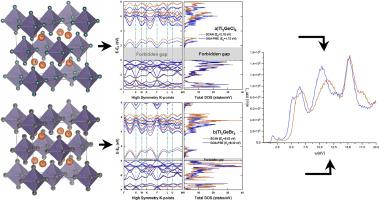Novel Tl2GeX6 (X=Cl,Br) double perovskites for solar cell, optoelectronic, and thermoelectric applications: A DFT investigation
IF 3.8
Q2 CHEMISTRY, PHYSICAL
引用次数: 0
Abstract
This study aims to investigate the structural, mechanical, optical, electronic, and thermoelectric properties of novel double perovskites Tl2GeCl6 and Tl2GeBr6. The Quantum Espresso code was employed to perform the Density Functional Theory (DFT) calculation on the perovskites’ characteristics. The results indicated that both materials exhibit chemical and structural stability, with equilibrium lattice constants of 10.08 Å and 10.55 Å for Tl2GeCl6 and Tl2GeBr6, respectively. The calculated elastic parameters and elastic moduli data also demonstrated that the new double perovskites exhibit mechanical stability while the calculated electronic band structure and the density of states using the PBE functional indicated that the materials are semiconductors with energy gap values of 0.3 eV for Tl2GeBr6 and 1.72 eV for Tl2GeCl6, respectively. Using more accurate SCAN approximation, the energy gaps were refined to 0.53 eV for Tl2GeBr6 and 2.10 eV for Tl2GeCl6. Additionally, the calculated dielectric functions, extinction coefficient and absorption coefficients of Tl2GeCl6 and Tl2GeBr6 strongly suggest the exceptional optical response of these materials. Notably, Tl2GeBr6 is estimated to have a particularly strong visible-light absorption capacity, positioning it as a promising absorber for perovskite solar cells. These findings are also supported by the low reflectivity values observed. Finally, the analysis of their thermoelectric properties revealed the excellent thermoelectric properties of Tl2GeCl6 and Tl2GeBr6, as indicated by their high figures of merit, predicted to be 0.73 and 0.68 for the respective perovskites.

用于太阳能电池、光电和热电应用的新型 Tl2GeX6(X=Cl,Br)双包晶:DFT 研究
本研究旨在探讨新型双包晶石 Tl2GeCl6 和 Tl2GeBr6 的结构、机械、光学、电子和热电特性。研究采用量子 Espresso 代码对包晶石的特性进行了密度泛函理论(DFT)计算。结果表明,这两种材料都具有化学和结构稳定性,Tl2GeCl6 和 Tl2GeBr6 的平衡晶格常数分别为 10.08 Å 和 10.55 Å。计算得出的弹性参数和弹性模量数据也表明,新型双包晶石具有机械稳定性,而使用 PBE 函数计算得出的电子能带结构和态密度表明,这些材料是半导体,其能隙值分别为 Tl2GeBr6 的 0.3 eV 和 Tl2GeCl6 的 1.72 eV。利用更精确的 SCAN 近似值,Tl2GeBr6 和 Tl2GeCl6 的能隙分别细化为 0.53 eV 和 2.10 eV。此外,Tl2GeCl6 和 Tl2GeBr6 的介电常数、消光系数和吸收系数的计算结果都有力地表明了这些材料的特殊光学响应。值得注意的是,据估计 Tl2GeBr6 具有特别强的可见光吸收能力,使其成为一种很有前途的过氧化物太阳能电池吸收剂。观察到的低反射率值也支持了这些发现。最后,对其热电性能的分析表明,Tl2GeCl6 和 Tl2GeBr6 具有出色的热电性能,这体现在它们的高优点系数上,据预测,这两种过氧化物的优点系数分别为 0.73 和 0.68。
本文章由计算机程序翻译,如有差异,请以英文原文为准。
求助全文
约1分钟内获得全文
求助全文
来源期刊

Chemical Physics Impact
Materials Science-Materials Science (miscellaneous)
CiteScore
2.60
自引率
0.00%
发文量
65
审稿时长
46 days
 求助内容:
求助内容: 应助结果提醒方式:
应助结果提醒方式:


